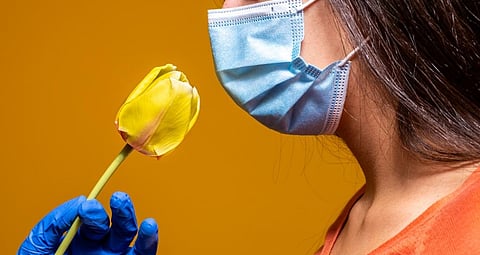I suffer from long COVID. Here is how I live without taste and smell
I have been living without two primordial senses for nearly 200 days now — smell and taste — and both are intimately connected. I tested positive for the novel coronavirus disease (COVID-19) towards the end of April this year, along with my wife and daughter.
As far as I remember, I lost my sense of taste and smell from the first week of May. As I write this, I have still not regained these two senses. Indeed, I am now almost reconciled to the scary possibility of living without them.
Or, it might just be a reconciliatory feeling that the long duration has instilled in me. Doctors have told me: “Have patience. It will come back.”
I reviewed many ‘inform yourself’ books that I collected when we were expecting our daughter. I just wanted to know whether the senses of taste and smell are biological or one develops them after birth.
This may sound like a foolish exploration for an existing biological being, but that is the level of frustration that this loss emotionally causes.
I am now assured that we are all born with five senses: Sight, hearing, smell, taste and touch. In fact, the nose forms in the first trimester of pregnancy and by 10 weeks, the baby, still in the womb, can smell things.
So, this is my first experience of living without smell and taste. And this experience answers another puzzling question for me: What happens if we lose taste and smell?
I am without two senses that primarily define our interface with the world, family, and the food that sustains us. I cook, but only enjoy it by deploying my pre-COVID memory of its taste and smell.
Stories and conversations on food are deliberately being re-told as we have dinner. So, I remember the specific taste and context of a dish that I consume. But physically, I just chew ‘things’, not being able to differentiate whether it is a piece of chicken or a fried piece of eggplant.
My appetite has reduced. I feel as if I am losing an ecosystem in which I grew up happy. In the vegetable market, I just do ‘shopping’. There is no more forensic evaluation of vegetables to ensure that particular taste and aroma in the final dish.
I have outsourced my senses to my wife and daughter — they taste and smell and remember my trademark dishes and give a verdict.
I just cook. There is no more of that indulgence that was an interface of social, biological and ecological things.
Every time I visited my home in Odisha, I came back with fresh chillies and lemons. They had a taste and aroma that bound me with my home and its ecology. They had a special, family-centric taste that I had imbibed in my memory. I consumed them to get that intimate connect and feel immense happiness. I can’t have that now.
It is just a memory, a clinical one. I am told the part of the brain that controls smell is also the one that controls memory. I don’t know if losing smell will lead to an altered memory as well.
Historians say without smell and taste, many colonisations wouldn’t have happened. For me, it could just be that I may find a disconnect with my kitchen, my most comfortable place at home where I hold India’s history and geography together in glass bottles.
A global emergency
In the six months since I tested positive for COVID-19, loss of taste and smell has been just one side-effect. Doctors have already listed 200 such effects that COVID-19 patients endure after recovery and those who endure any of them for more than a month, are being termed as suffering from ‘long COVID-19’.
I am undoubtedly a ‘long COVID’ patient. I have other side effects as well: Loss of hair; anxiety attacks, though they are less frequent now; a nagging brain fog; fatigue that has reduced by now but I still feel drained sometimes; pain in my lower legs; a dry skin condition and infrequent bouts of palpitations.
As of November 18, there are over 230 million COVID-19 recovered people in the world, just like me. The fight against the pandemic continues, but there is an increasing focus on the recovered population enduring long COVID-19. Such a significant population group has been sick with 200 types of side-effects for months. It is a medical, economical and social emergency, almost.
In a recent research (not peer reviewed), researchers from the University of Michigan estimated that 100 million of COVID-19 recovered people globally have been enduring long COVID-19. The researchers reviewed 40 studies from 17 countries on lingering side effects of COVID-19 to come to this conclusion.
They estimated that 40 per cent of the COVID-19 survivors suffer from the side-effects. The rate increases to 57 per cent for those who were hospitalised for COVID-19 treatment.
More women than men have long COVID-19: The University of Michigan study finds that 49 per cent of the recovered women patients have long COVID while it is 37 per cent for men.
The long COVID-19 is proportionate to the new infection cases. The more new cases pop up — the pandemic is still raging and Europe is currently witnessing a resurgence — the size of the recovered population group will also increase.
It means the probability of more people enduring long COVID-19 also increases. In the process, we will have a scenario when the world has more long COVID patients than those getting the infection fresh. And, at this point of time, the world health response will be just for this.
Richard Mahapatra is Managing Editor, Down To Earth


